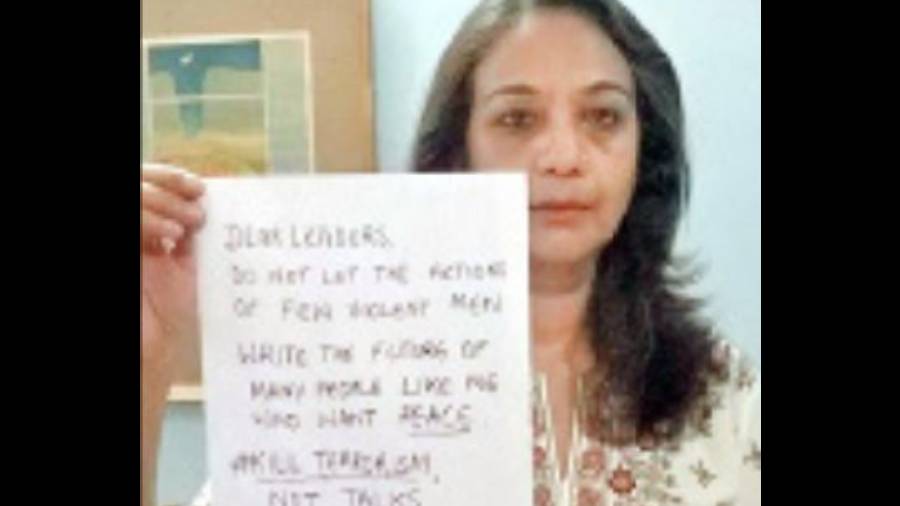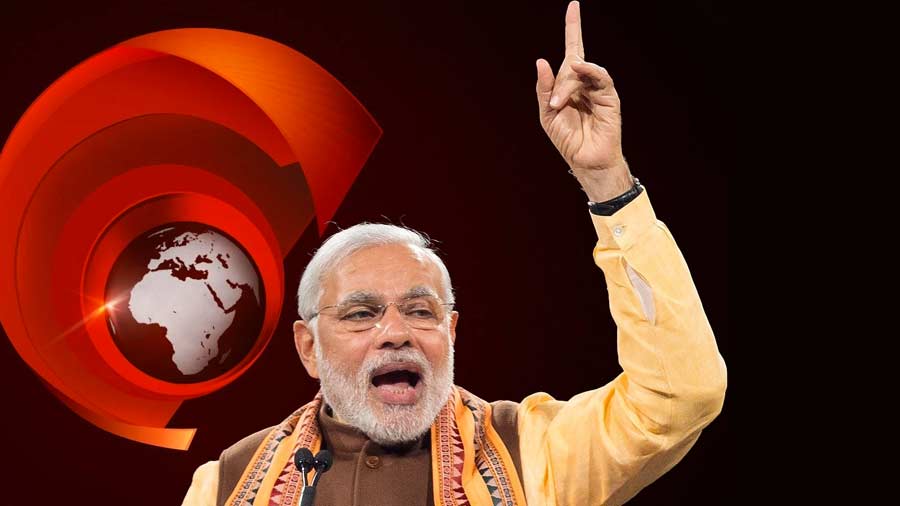The Jammu-based editor of the Kashmir Times newspaper has in an opinion piece published in The New York Times accused the Narendra Modi government of stifling press freedom in Kashmir and the rest of India, infuriating the Centre.
Anuradha Bhasin, owner and executive editor of the Kashmir Times, has in the article suggested that Prime Minister Modi might replicate “on a national scale” the “disturbing model” executed in Jammu and Kashmir.
“His Hindu-chauvinist movement, which has normalised intolerance and violence against Indian Muslims, has already put severe pressure on India’s once-rambunctious press, with journalists surveilled and jailed, and the government using strong-arm tactics against media outlets to ensure favourable coverage,” says the op-ed article, published on Wednesday under the headline “Modi’s final assault on India’s press freedom has begun”.
Union information and broadcasting minister Anurag Thakur on Friday slammed The New York Times but chose not to mention the author, whose newspaper was among the very few to speak out against the government clampdown on Jammu and Kashmir after the dilution of Article 370 in August 2019. Bhasin had challenged in the Supreme Court the communication blockade imposed in the region in 2019.
Bhasin’s article in NYT says: “In January, draft amendments to digital media guidelines were introduced that would essentially allow the government to block any content it doesn’t like.”
“An ignorant public and a government free of scrutiny and accountability are threats to democracy. But Modi appears intent on replicating this across India. The proposed amendments to national guidelines for digital media that were unveiled in January are strikingly similar to those imposed on Kashmir, empowering government fact-checkers to label online content as fake or false.
“Days after those changes were announced, the government ordered online platforms to block links to India: The Modi Question, a BBC documentary critical of the Prime Minister. Indian tax agents later raided the British broadcaster’s offices in India. Such raids have been used repeatedly to pressure critical voices in the media.”
Bhasin recently released her maiden book, A Dismantled State: The Untold Story of Kashmir After Article 370. She is presently in the US.
In her opinion piece, she has accused Modi of systematically debasing India’s democratic ideals, bending courts and other institutions to his will. “The media stands as one of the last remaining institutions capable of preventing India’s descent into authoritarianism. But if Modi succeeds in introducing the Kashmir model of information control to the rest of the country, it won’t be just press freedom that is at risk, but Indian democracy itself,” she says.
On Friday, Union minister Thakur tweeted: “New York Times had long back dropped all pretensions of neutrality while publishing anything about India.” “NYT’s so called opinion piece on freedom of press in Kashmir is mischievous & fictitious, published with a sole motive to spread propaganda about India and its democratic institutions and values.”
The minister added: “This is in continuation with what NYT and a few other link-minded (sic) foreign media have been spreading lies about India and our democratically elected Prime Minister Shri Narendra Modiji. “Such lies can’t last long. Some foreign media nourishing a grudge against India and our Prime Minister Shri Narendra Modi have long been systematically trying to peddle lies about our democracy and pleuritic (sic) society.” Thakur said that in India, media freedom was “as sacrosanct as other fundamental rights”.
“Democracy in India and We the people are very matured and we don’t need to learn grammar of democracy from such agenda driven media. Blatant lies spread by NYT abt press freedom in Kashmir is condemnable. Indians will not allow such mindsets to run their decisive agenda on India soil,” he tweeted.
Bhasin has been trolled vigorously over the article by the Right-wing ecosystem, which has not spared her late father Ved Bhasin, an eminent journalist who supported independence for Kashmir.
Kashmir Times, the oldest English daily in Jammu and Kashmir, is headquartered in Jammu but also ran an edition from Srinagar. But it had to close its Srinagar edition a few months after the August 2019 clampdown because of a financial crunch, having been starved of government advertisements in an apparent act of reprisal.
In October 2020, the administration sealed the newspaper’s Srinagar office, which operated from government space allotted to the daily in 1993 along with some other newspapers and journalists.
Bhasin had called it a vendetta against her decision to approach the Supreme Court and for constantly talking about the curbs on civil liberties and lack of democratic space in Kashmir.
Bhasin’s NYT piece details the ordeal Jammu and Kashmir’s journalists faced after August 2019, when physical movement and Internet access were curbed.
“The shutdown lasted nearly six months, forcing hundreds of journalists to line up for hours to file their stories via a single designated site that had Internet access. Each had 15 minutes to do so. Internet speeds have been excruciatingly slow since,” the article says.
“Journalists are routinely summoned by police, interrogated and threatened with charges such as income tax violations or terrorism or separatism. Several prominent journalists have been detained or sentenced to jail terms.”
Bhasin writes that journalists work under a cloud of fear. “In late 2021, I spoke to a journalist, Sajad Gul, who was being harassed for his reporting. Fearing arrest, he told me he slept fully dressed each night and kept his shoes at his bedside — unusual in Kashmir, where shoes are customarily removed before entering a home — in case he had to make a quick getaway. He was arrested in January last year and remains in custody,” the article says.
“Many journalists self-censor or have simply quit. Fearing arrest, some have fled into exile overseas. The Indian government has put at least 20 others on no-fly lists to prevent them from leaving the country.” While the opinion piece has triggered a debate in the country and outside, most Valley journalists chose not to share or comment on it, perhaps for the fear of being hounded. The article mentions how the Srinagar office of the Kashmir Times was raided on October 19, 2020, evening while “its reporters and photographers rushed to meet deadlines”.
“Government officials and police swept into the offices in Srinagar, chased out the staff and locked the door that remains to this day,” it says. “The raid was punishment for daring to question the policies of PM Modi. The newspaper has been an independent voice in J&K since it was founded by my father in 1954, weathering tumultuous decades of war and military occupation. It may not survive Mr Modi. His repressive media policies are destroying Kashmiri journalism, intimidating media outlets into serving as government mouthpieces and creating an information vacuum in our region of about 13 million people.”
Bhasin claimed that Kashmiri journalism had flowered against heavy odds in the past but all of “that has disappeared under Mr Modi, whose government aims to silence any separatist voices or those advocating conciliation or a negotiated settlement in Kashmir”.
“Kashmiri newspapers are heavily reliant on government advertising and media subsidies, and the government uses that leverage to ensure that those newspapers tell the officially approved version of the truth. Today, few Kashmir news outlets dare to question official policy, and many have become blatant government mouthpieces just to stay in business,” Bhasin’s article says. “An information vacuum hangs over Kashmir, with the public under-informed — or misinformed — about what’s going on in the region. Important news is suppressed, downplayed or twisted to suit government ends.” Qazi Irshad, a photojournalist with the Kashmir Times, said that while the newspaper’s Srinagar office was shut, its Jammu office operated with skeletal staff. “Some two dozen staff lost their jobs when the print edition was closed here (in Srinagar),” he told The Telegraph.
“The tragedy is that when the government recently opened the (locks of the) Srinagar office, I happened to be around and accompanied them. I found all the things — old files, equipment including a generator worth lakhs — missing from one of the two buildings. I spoke to the editor who asked me to file a complaint with the police, which I did.
“No FIR was lodged and no policeman arrived at the spot to verify. The space has now been handed over to some political party.”











